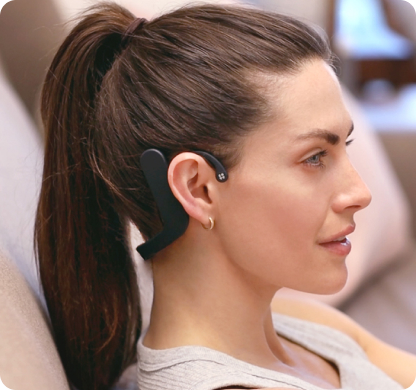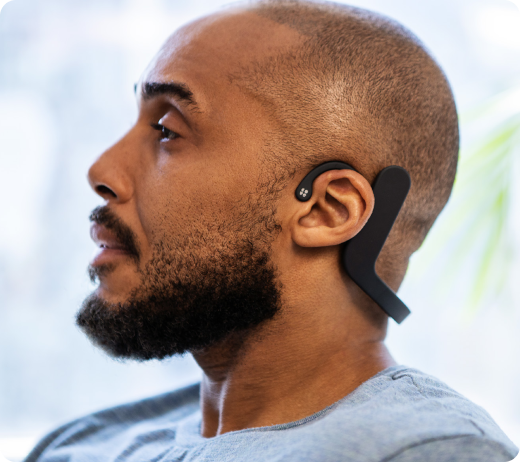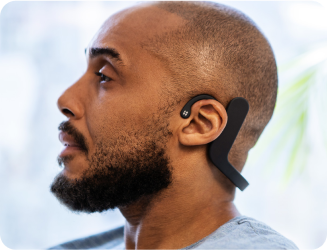Harnessing the science of touch to improve mental wellbeing.
Harnessing the science of touch to improve mental wellbeing.
Neuroscience reveals that you can strengthen mental resilience by stimulating specialized receptors on the skin. This stimulation activates the body’s affective touch response—the same response that’s at play when a baby is soothed in its parents arms or when you feel comforted by a loved one’s caress. Research shows that affective touch can reduce stress, improve sleep, and boost mental clarity. Cove’s technology instrumentalizes this science.


The calming power of touch
Ever felt more calm following the gentle caress of a loved one? That feeling is no accident. It’s called the affective touch response and it works by activating a powerful skin-to-brain pathway.
Affective touch refers to the type of slow, soft physical contact that, as social mammals, we’re pre-wired to find soothing. Your skin has specialized receptors for detecting this kind of touch; and, when stimulated, these receptors activate a brain pathway critical to mental wellbeing.
In doing so, affective touch instantly promotes feelings of safety, relaxation, and belonging. Regular exposure to this kind of physical contact can also help you sleep better and build resilience to stress in the long run.
Intro to the insula
When the skin’s affective touch receptors are activated, they send a calming signal to a brain region known as the insular cortex, or insula. A richly connected structure buried deep in the brain, the insula exchanges signals with both the skin and with brain areas that process emotion. In other words, it connects your sense of touch with your sense of wellbeing.
More generally, the insula processes information about what’s happening in your body and in other brain regions. As such, it plays an important role helping you feel physically comfortable and emotionally stable. The insula also forms part of a larger brain pathway that is critical to healthy sleep, stress management, and general wellbeing.
Gentle touch, at just the right speed and pressure, stimulates special receptors on the skin. This signal is then relayed from the skin to the insula, promoting a sense of relaxation. It also strengthens key connections in the insula, improving your sleep and resilience to stress in the future.
Cove’s Affective Touch Therapy
Cove’s patented vibration technology stimulates specialized skin receptors, which interpret the vibration signal as affective touch; in doing so, the device activates the affective touch response in the brain, promoting activity in the insula. With regular use, Cove strengthens connections in this structure, helping you to sleep better, stress less, and think more clearly. These benefits have been validated by a series of clinical studies, including multiple brain imaging experiments.
In a single session, Cove activates the insula and helps you feel calm
Using a technique called electroencephalography (EEG), scientists tracked brain activity during a 20-minute Cove session. They observed an increase in alpha waves, a type of brain activity that often appears during meditation and indicates relaxation. EEG also showed that Cove prompts changes in brain activity just above the insula, confirming that the device works by activating the affective touch response.



From relaxation to resilience
While some users feel calm after just one Cove session, research shows that consistent daily use can lead to more profound changes. Using fMRI, a type of brain scan, we found that Cove strengthens connections between the insula and brain regions that process emotion. For many users, these brain changes are associated with better sleep and improved mental resilience.
These benefits have been validated by rigorous research, including independent studies at Brown University and the work of a leading clinical researcher from Harvard Medical School.
3500 total participants
Participants took part in several clinical studies, including exploratory research. Their stress, anxiety, and sleep quality were analyzed while using Cove for both single sessions and over 30 day periods.
90% of participants stressed less and slept better
Immediate and lasting stress reduction
Various clinical studies proved that Cove effectively reduces stress. A significant majority of participants experienced less stress after wearing the device, with many still feeling the effects months later.
Significant sleep benefits
Sleep studies conducted over 30 days reveal that consistent daily use of Cove led to improved sleep quantity and quality, as well as falling asleep faster.
Improved mental performance
A study of daily Cove users revealed that, after using the device for 30 days, participants experienced significant improvements in mental performance, including:
The first and only peer reviewed wearable technology proven to reduce anxiety
A peer-reviewed and independent study examined the effectiveness of Cove’s underlying technology among people with anxiety and other mood disorders. Researchers at Butler Hospital (affiliated with The Warren Alpert Medical School at Brown University) found that participants experienced significant improvements in symptoms, and that those improvements were associated with changes in the brain areas responsible for emotional regulation.



Real world benefits: Cove reduces stress and improves sleep in first responders
A recent study performed by Feelmore Labs in two major US cities showed that Cove improves mental wellness among first responders—a population that regularly faces stressful conditions and long hours. The group’s stress dropped by 23% and their sleep quality improved 61%.
U.S. Patent No. 10,786,666. U.S. and International Patents Pending. Copyright © 2021 Feelmore Labs, Inc. All Rights Reserved.
Payments accepted: VISA, Mastercard, AMEX, Discover, PayPal, and Affirm.
